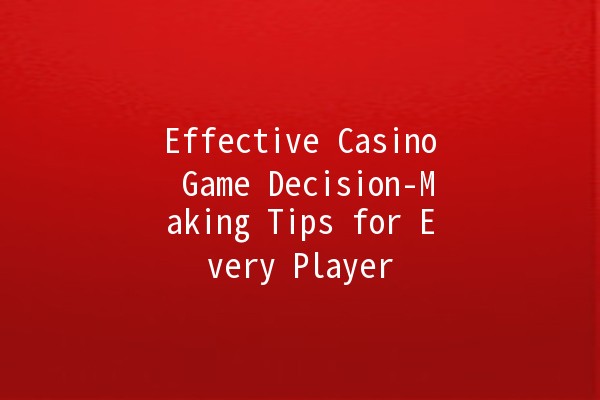The world of casino gaming is not just about luck; it's also about making informed decisions. Whether you're sitting at a poker table, spinning the roulette wheel, or playing slots, understanding how to make the right choices can significantly enhance your experience and potentially boost your winnings. This article aims to provide practical strategies that can aid players in making smarter decisions while playing various casino games. Here are some essential tips to keep in mind.
Before placing your bets, it's crucial to understand how the game works. Each casino game has its own set of rules, strategies, and odds that define your chances of winning.
Practical Application:
For example, if you're playing blackjack, familiarize yourself with basic strategies like when to hit or stand based on the dealer's showing card. You can find charts online that outline the best course of action in various scenarios. In games like poker, understanding hand rankings, bluffing tactics, and betting rounds is vital to making informed decisions. Studying these aspects will bring you closer to mastering the game.
Bankroll management is a fundamental skill that can make or break your gaming experience. This involves setting a budget for your gaming sessions and adhering to it strictly.
Practical Application:
Determine a fixed amount of money you’re willing to spend before starting your gambling session. Divide this into smaller session budgets. For instance, if you've set aside $300 for the weekend, you can divide it into five $60 sessions. This way, you can avoid overspending in one go and have enough funds to enjoy multiple sessions.

Some casino games offer better odds than others. Games like blackjack, baccarat, and certain versions of video poker typically have a lower house edge compared to games like slots or roulette, which are more luckbased.
Practical Application:
Research and compare the house edges of the games before making your decision. For example, blackjack usually has a house edge of about 1% if played optimally, while slots can have a house edge that varies greatly, often ranging between 5% to 10%. Opt for games that maximize your chances of winning over the long run.
Many casinos offer bonuses and promotions to attract players. These can include signup bonuses, free spins, or loyalty rewards. Utilizing these offers can provide you with additional opportunities to play without risking your own money.
Practical Application:
For instance, if you join an online casino that offers a 100% signup bonus on your first deposit, you can double your starting bankroll. Make sure to read the terms and conditions associated with these offers, especially the wagering requirements, so you can use them effectively without falling into traps that might lead to losses.
It's easy to get carried away with emotions while gambling, especially if you’re on a losing streak or feeling overly confident during a winning streak. Making decisions based on emotions rather than logic can be detrimental to your bankroll.
Practical Application:
Implement a “coolingoff” strategy. If you find yourself getting frustrated or overly excited, take a break from the game. This could mean stepping away from the table for a few minutes or even calling it a day. When you return, you’ll be in a better mental state to make rational decisions.
Understanding the decisions you make at the casino can dramatically change your experience and outcomes. By mastering the game rules, managing your bankroll, choosing games wisely, using bonuses to your advantage, and maintaining emotional control, you can enhance your gaming strategy and enjoyment.
Frequently Asked Questions
The house edge refers to the mathematical advantage that the casino has over players. It is expressed as a percentage of the total bets made. For example, if a game has a house edge of 5%, the casino expects to keep $5 for every $100 wagered in the long run. Understanding the house edge can help players select games that offer better odds.
Improving your poker skills requires practice and study. Consider reading books about poker strategy, watching instructional videos, and practicing through online platforms or home games. Additionally, analyzing your plays after each session can help identify mistakes and improve your decisionmaking over time.
While bonuses can provide extra funds to play with, they often come with wagering requirements that must be met before you can withdraw any winnings. Carefully read the terms and conditions, and only accept bonuses if you understand how they work and feel confident you can meet the requirements.
Roulette outcomes are largely random due to the nature of the game. While betting strategies like Martingale exist, there is no way to predict where the ball will land. Understanding the odds associated with different bets can help you make more informed choices rather than relying on luck alone.
The amount of money you should bring depends on your bankroll management strategy. Never bring more than you can afford to lose, and consider setting a budget for each gaming session. This will help you enjoy your time without financial stress.
The best time to play can depend on what you’re looking for. If you prefer quieter times to enjoy better service and less crowded tables, weekdays or offpeak hours are generally ideal. Conversely, if you enjoy a vibrant atmosphere and the excitement of a bustling casino, peak hours on weekends will provide that experience.
By adopting these decisionmaking tips, you can make your time at the casino both enjoyable and potentially profitable. Empower yourself with knowledge and strategies that can lead to a more rewarding gaming experience!